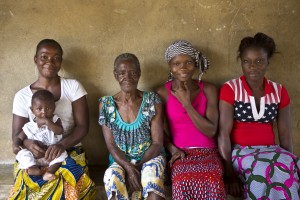UNHCR holds emergency training in Senegal
Forty-one aid workers are gathering in Thies for 10 days of intense lectures and simulation exercises
UNHCR’s high-quality emergency training has just started in Thies, 75 kilometres north of the Senegalese capital Dakar, and will last until 18 March. It is the second time that the Workshop on Emergency Management (WEM) is happening on the African continent. Designed to provide practical training to aid workers for UNHCR emergency operations worldwide and strengthen team work, this year’s WEM in Senegal gathers forty-one participants, mainly from Africa, Asia, Central America, Europe and the Middle East. *
While the first edition – which also took place in Thies in May 2015 – was in French, this year will be an all-English-speaking event. In 2015, UNHCR experienced unprecedented demands for deployment of additional staff across south-eastern Europe. As refugee and migrant flows continue to take place in that part of the world, UNHCR expects to need more anglophone staff in the months ahead.
“The WEM is probably the most popular course offered to the UN Refugee Agency’s personnel” says Peter Kessler, from UNHCR’s Global Learning Center in Budapest. “Participants are highly motivated and know there is a good chance they will be deployed to an emergency situation in the coming months”. Once they have completed the training, participants will join UNHCR emergency roster and are to be ready for deployment within 72 hours, for a minimum period of two to three months.
Since its creation in 1989, the WEM has been organized in European countries** and in the United States, and participants have been mainly deployed to Asia, the Middle East or Africa, where most of the displacement of populations and major crisis have been occurring in the past decades. “ Given the unprecedented scale and amount of displacement crises we are facing today, it is only a good thing to have variety in the training environment” , says Mathijs Le Rutte, UNHCR Regional Deputy Representative for West Africa, and one of the main initiators of the WEM on African soil. “This just shows that we are ready to quickly adapt to changing realities and new crises and that Africa is definitely becoming a regular location for UNHCR for these kind of trainings.”
The WEM includes didactic classes for five days, taught by experts in sectors such as logistics, protection, law, human resources, health, administration, finances, programming, media, telecommunications, database management, mapping and safety. These lectures are followed by four days of field exercises.

Thirty-six UNHCR aid workers and five employees from NGOs and the donors’ community will participate in this second edition of the WEM on African soil. UNHCR / Helene Caux
Like last year, the Government of Senegal is kindly providing the venue for the WEM at the Thies military base, an army training center regularly used for peace-keeping missions and military exercises. “It requires a lot of planning and logistic preparation!” says Martine Israel, UNHCR Supply officer in Dakar. “The “Wemers” will first sleep in containers, the comfort is modest, similar to settings humanitarian workers find in remote locations in a developing country. Then, participants will be transported to a site 20 kilometres away from Thies for simulation training. They will camp in tents once there.” Participants have all received a health kit containing, among other things, antibiotics, anti-malaria pills and mosquito nets. Food rations are being provided by the United States Embassy.
“I am a little bit anxious but overall, I am very excited to be part of that training” says Pauline Hilmy, Associate Regional Protection Officer for UNHCR in Dakar, and one of the 40 participants in Thies. “ The WEM is meant to prepare you for some very difficult situations, with very realistic simulations and exercises, such as kidnappings. I look forward to it!”
Three to four WEM sessions take place every year in the world. While participants are mainly UNHCR staff from various professional backgrounds such as Programme, Protection, Finance and Public Information, some employees of non-governmental organizations as well as donors may also be selected. Partners’ agencies sending participants to Thies this week and next week include the Nigeria’s Borno State Emergency Management Agency, the Adamawa State Emergency Management Agency, the Danish Refugee Council, the Norwegian Refugee Council and the United States Government’s Bureau for Population, Refugees and Migration (BPRM).
“The WEM has always been very highly spoken of by my colleagues who have done the training in the past, so I always told myself that if I had the chance to participate, I’d take it” says Skye Justice, Regional Refugee Coordinator for BPRM in Dakar. “ The United States relies so much on UN partners in the field, like UNHCR, to conduct emergency response and advise on our own humanitarian policies. I’m really looking forward to better understanding how UNHCR prepares staff to be deployed on emergency missions, when quick action must be taken to help refugees”.
The WEM is organized by the UNHCR Global Learning Centre for Emergency Services, UNHCR’s Regional Representation in West Africa, and the Division of Emergency, Security and Supply. Other units closely involved include various services within the Division of Programme Support and Management, the Staff Health and Welfare Service, the Division of External Relations. Each WEM costs more than $200,000. This exercise in Senegal is funded by United Kingdom Aid, which is the Department for International Development of the British Government. More than 3,000 people have been trained and deployed on emergency missions around the world since the WEM started 27 years ago.
* Participants this year come from UNHCR operations in Afghanistan, Azerbaijan, Chad, Colombia, Costa Rica, Egypt, Ethiopia, Ghana, Greece, Hungary, India, Iran, Jordan, Kenya, Korea, Lebanon, Liberia, Libya, Malaysia, Nigeria, Nepal, Pakistan, Senegal, Sudan , Switzerland and Turkey.
** France, Germany, Norway, the Netherlands, Spain, Sweden, Switzerland




















